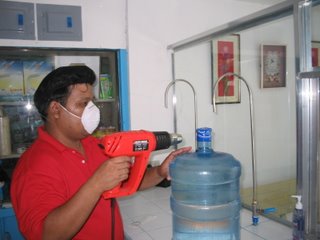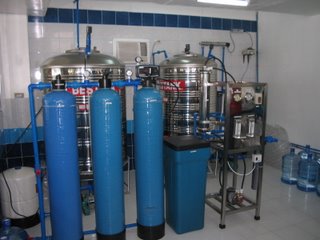 If somebody told me ten years ago that I, together with a large part of the population of Lianga, would be drinking solely purified water from a water refilling station I would have thought that somebody had a sudden attack of insanity or had too much to drink of tuba, the local coconut wine. After all, this coastal town does not exactly suffer from a shortage of sources for water and practically anywhere in town all you have to do is drive a pipe less than fifty feet and you can pump out sufficient quantities enough for household use. It is not the supply of water that is the problem but its potability.
If somebody told me ten years ago that I, together with a large part of the population of Lianga, would be drinking solely purified water from a water refilling station I would have thought that somebody had a sudden attack of insanity or had too much to drink of tuba, the local coconut wine. After all, this coastal town does not exactly suffer from a shortage of sources for water and practically anywhere in town all you have to do is drive a pipe less than fifty feet and you can pump out sufficient quantities enough for household use. It is not the supply of water that is the problem but its potability.Decades ago, nobody worried about chemical, mineral or bacterial contamination in the water. Water was water and whatever the source, all drank it without any fuss. That, of course, is no longer true today and there are internationally accepted standards for determining the suitability of water for drinking purposes that are promoted even in remote towns like Lianga.
The town has a utilities company that has responsibility for managing the local water supply system. But budget limitations and an outdated distribution infrastructure have not exactly been an assurance against contamination. In the past, salt water intrusion in the water supply was a serious problem and although that problem has been minimized, the purity and potability of the water coming out of local faucets have remained doubtful.
 Purified water from commercial water refilling stations have provided the people of Lianga with access to safe drinking water and have no doubt contributed greatly to a reduction in cases of waterborne diseases. They have filled the gap in essential services that the government has not been able to provide. It is, however, an expensive alternative and an additional financial burden in times of economic hardship.
Purified water from commercial water refilling stations have provided the people of Lianga with access to safe drinking water and have no doubt contributed greatly to a reduction in cases of waterborne diseases. They have filled the gap in essential services that the government has not been able to provide. It is, however, an expensive alternative and an additional financial burden in times of economic hardship.But until the government can invest in the needed infrastructure and expertise that will ensure that small towns like Lianga can finally have access to truly potable water in their own homes, then water refilling stations will have to stay and people will have to pay dearly for something that is supposed to be theirs for little or no cost at all.
No comments:
Post a Comment